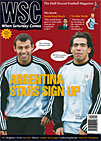 Tuesday 1 Steve McClaren begins his first day as England manager by saying: “It will be totally different from Sven and the past five years. I’m going to do it my way.” Liverpool’s Champions League opponents Maccabi Haifa are contesting UEFA’s plan to switch the Israel leg of their tie to a neutral venue. That man Ken Bates is to report Chelsea to the Premier League, the FA, FIFA and the World Council of Churches after claiming they recruited two Leeds youth-team players through an illegal approach. José Antonio Reyes is hoping to tie up a move to Madrid: “Real are like a candy that is difficult to turn down.” Ghana full-back John Pantsil joins West Ham.
Tuesday 1 Steve McClaren begins his first day as England manager by saying: “It will be totally different from Sven and the past five years. I’m going to do it my way.” Liverpool’s Champions League opponents Maccabi Haifa are contesting UEFA’s plan to switch the Israel leg of their tie to a neutral venue. That man Ken Bates is to report Chelsea to the Premier League, the FA, FIFA and the World Council of Churches after claiming they recruited two Leeds youth-team players through an illegal approach. José Antonio Reyes is hoping to tie up a move to Madrid: “Real are like a candy that is difficult to turn down.” Ghana full-back John Pantsil joins West Ham.
The Archive
Articles from When Saturday Comes. All 27 years of WSC are in the process of being added. This may take a while.
 As Juventus go kicking and screaming into Serie B, Matt Barker reports on the failure of the new board to realise just how seriously the Moggi match-fixing scandal has damaged the club's reputation
As Juventus go kicking and screaming into Serie B, Matt Barker reports on the failure of the new board to realise just how seriously the Moggi match-fixing scandal has damaged the club's reputation
When, in July, the initial sentences in the Moggiopoli scandal were announced, Juventus appeared to take their punishments with reasonably good grace. They would, club officials claimed, co‑operate fully with the legal process and abide by whatever penalties were imposed. There was talk of a club reborn and, in the shadow of sporting director Gianluca Pessotto’s attempted suicide, of a more humble side to La Vecchia Signora. Some people even started to feel a little sympathy for them.
 Some people are never happy – take Bayern Munich. Dominant at home but toothless abroad, the German champions have taken out their frustration on Owen Hargreaves, as Karsten Blaas reports
Some people are never happy – take Bayern Munich. Dominant at home but toothless abroad, the German champions have taken out their frustration on Owen Hargreaves, as Karsten Blaas reports
When Bayern Munich secure yet another Bundesliga title, mostly with two or three games to spare, the players gather in the centre circle after the final whistle to celebrate. They start jumping up and down and wave at the crowd. One of them, usually Hasan Salihamidzic or Bastian Schweinsteiger, produces a large glass of wheat beer, a Bavarian speciality, and pours it over somebody else’s head. Oliver Kahn clenches his fists and grits his teeth at the supporters and throws his gloves into the crowd. After about 15 minutes, the players gradually disappear into the dressing room. It’s a dull procedure, probably even for those who feel affiliated to the club.
 The fizz went out of football for a lot of fans in Salzburg, thanks to an energy-drink billionaire. In this update, Paul Joyce reports on the lower-league alternative to a team drained of its colour
The fizz went out of football for a lot of fans in Salzburg, thanks to an energy-drink billionaire. In this update, Paul Joyce reports on the lower-league alternative to a team drained of its colour
The acquisition of SV Austria Salzburg by Red Bull owner Dietrich Mateschitz in April 2005 reduced the 1994 UEFA Cup finalists to a mere marketing trinket. “There is no tradition, no history, no archive,” stated officials of the renamed “Red Bull Salzburg”, who initially claimed that the three-time national champions had been founded in 2005. The violet-and-white colours in which the team had played since 1933 were jettisoned in favour of the red and blue of the energy drink’s tin cans. “I can’t play with a purple bull if the brand is called Red Bull,” Mateschitz stated bluntly.
 José Mourinho can count himself lucky that he doesn't answer to Real Madrid's president. Phil Ball reports
José Mourinho can count himself lucky that he doesn't answer to Real Madrid's president. Phil Ball reports
Can’t somebody just ban Real Madrid, for ever? Their behaviour since the resignation of president Florentino Pérez in February has defied all codes of both sporting and business practice – an assault on basic decency so serious that it is only surpassed in surrealism by the fact that no one saw fit to do anything about it. Arrogance and a certain disrespect for others have always been the hallmark of Real Madrid CF, traditionally a curious mixture of market-led imperialism and the worst type of insularity. But the recent goings-on have stretched the club’s credibility to limits beyond the known galaxy, from where many of their players were originally rumoured to have come.